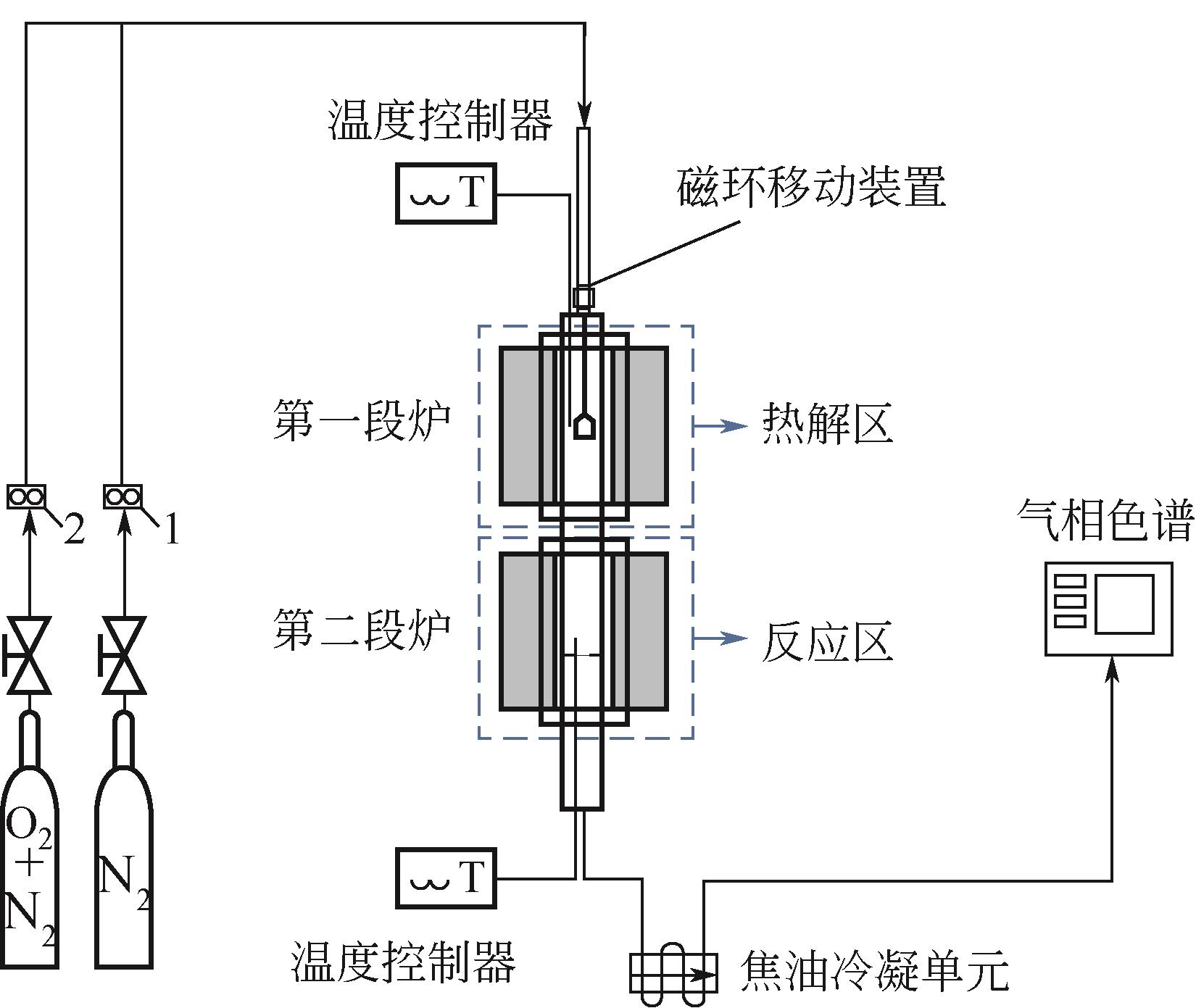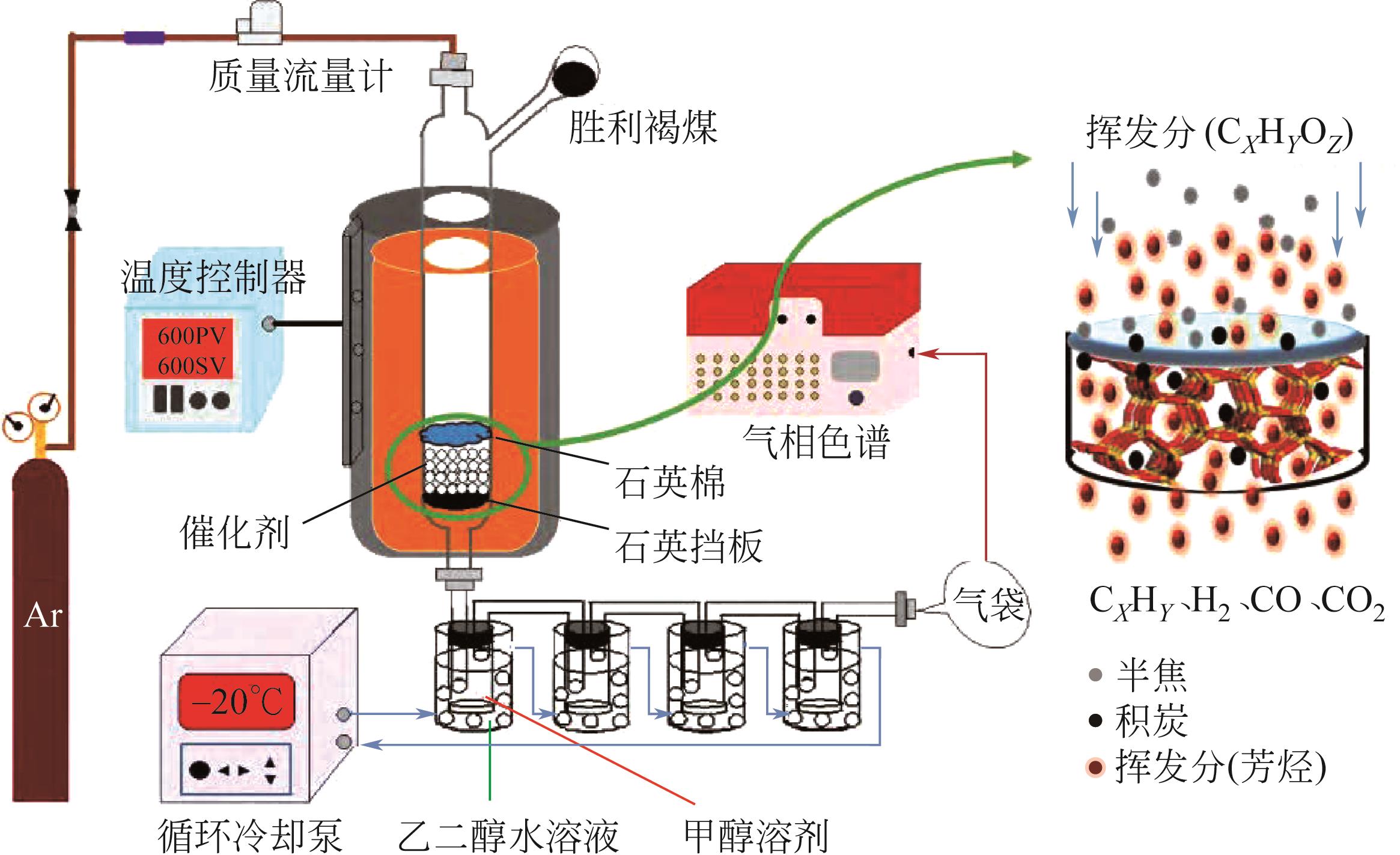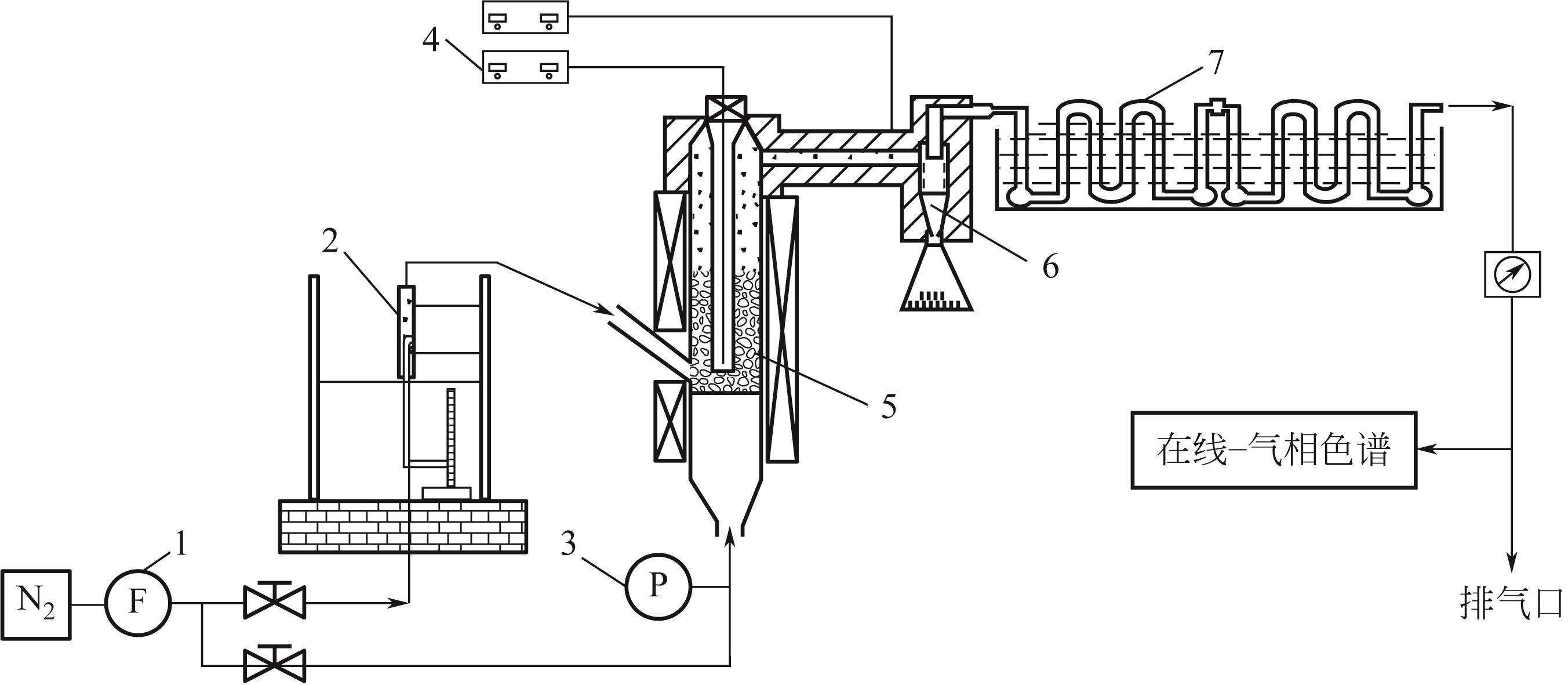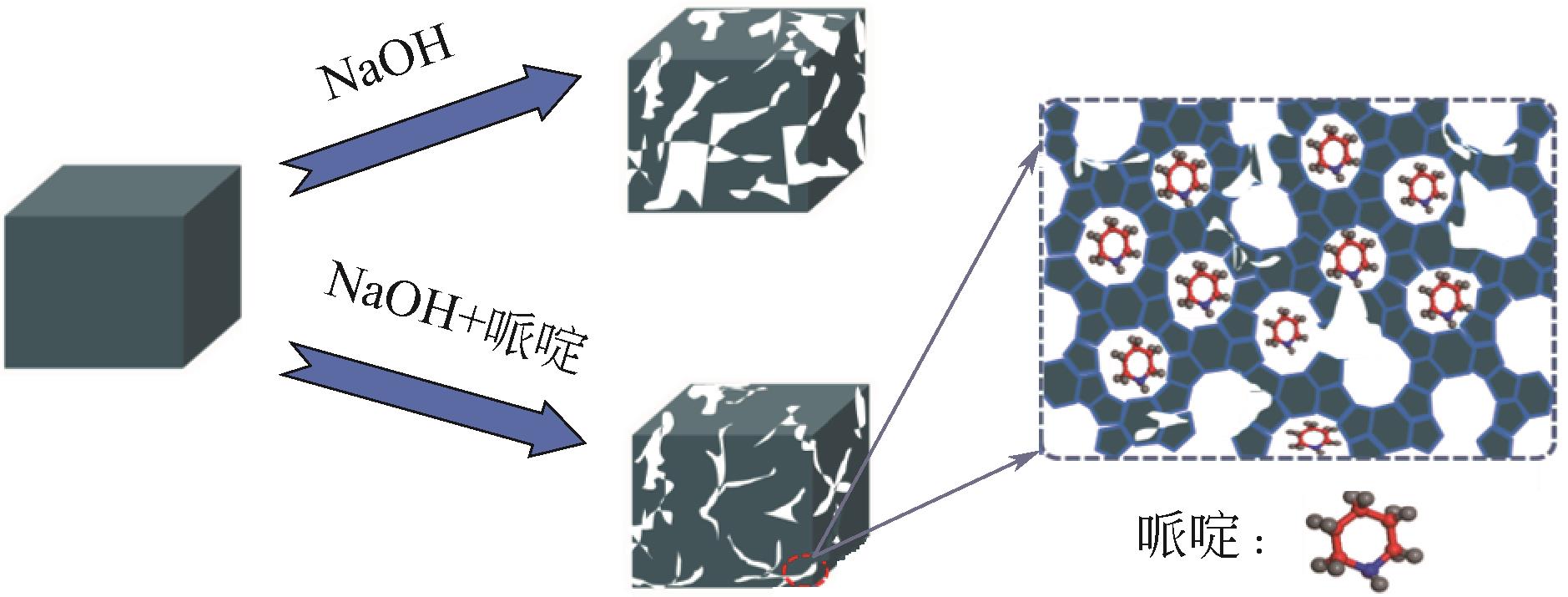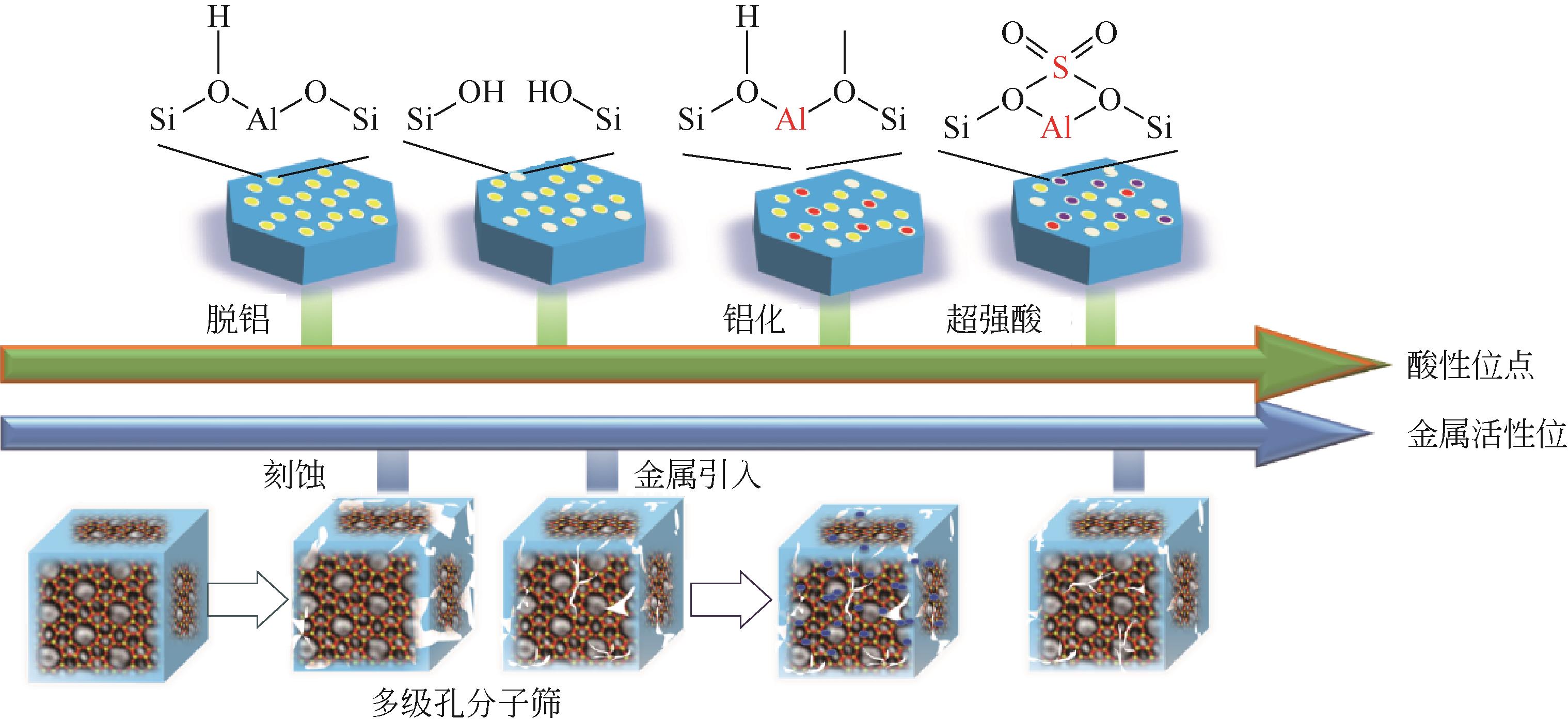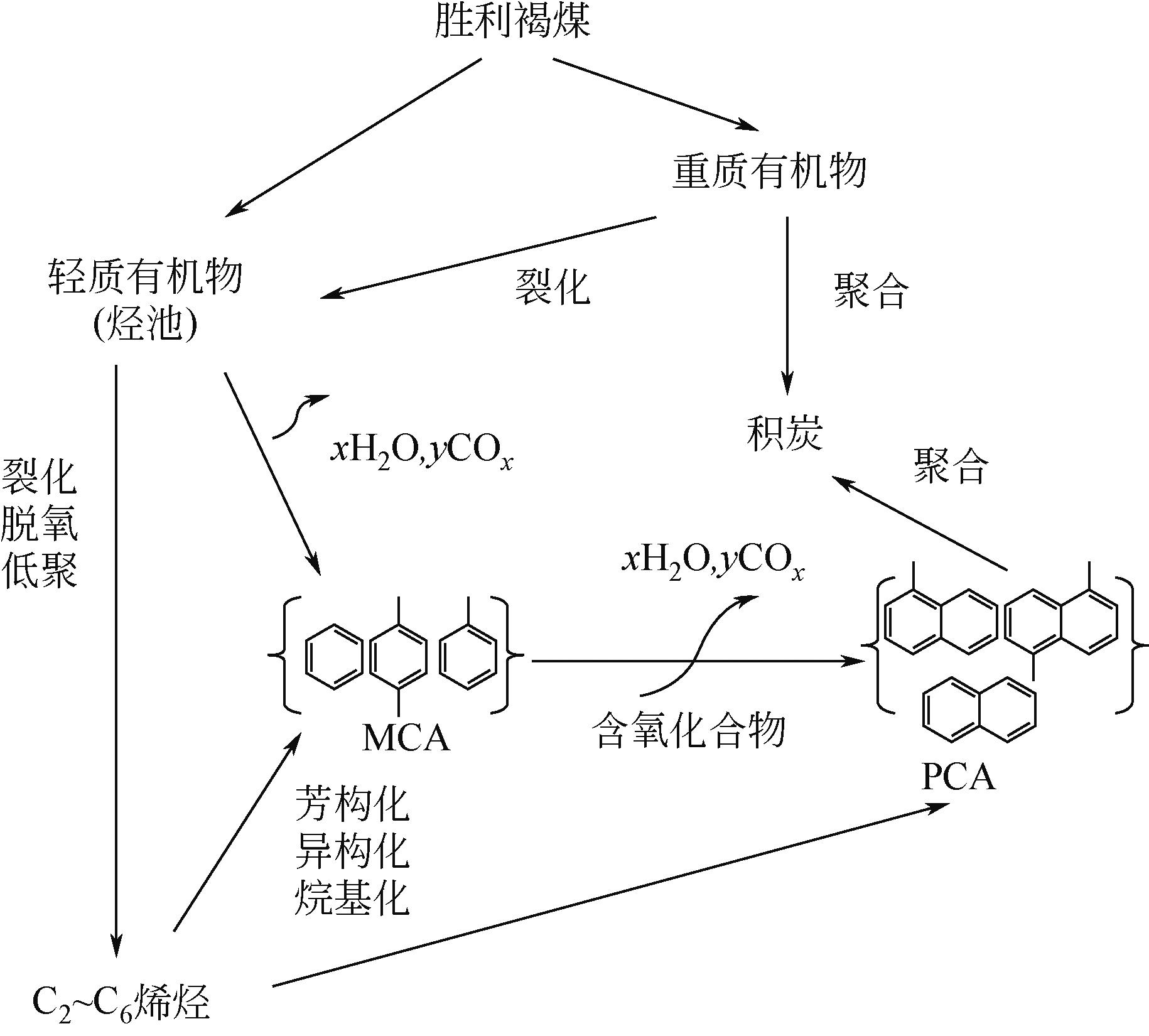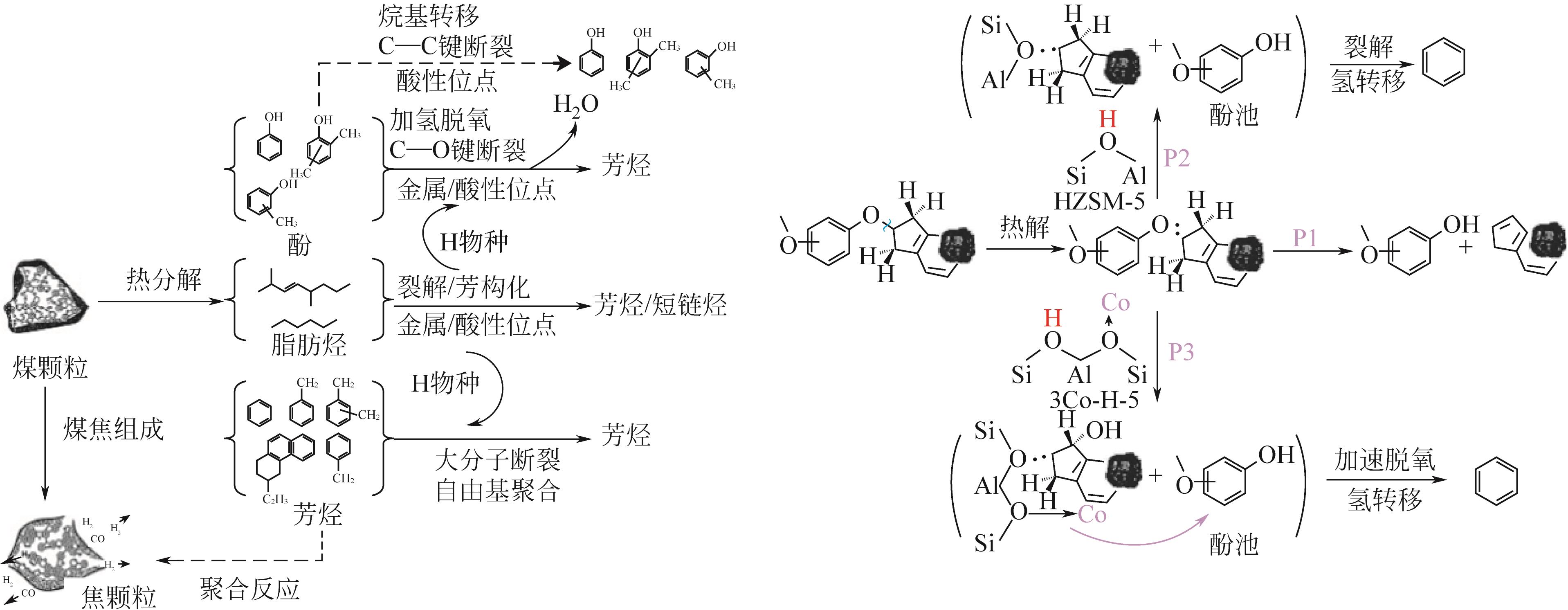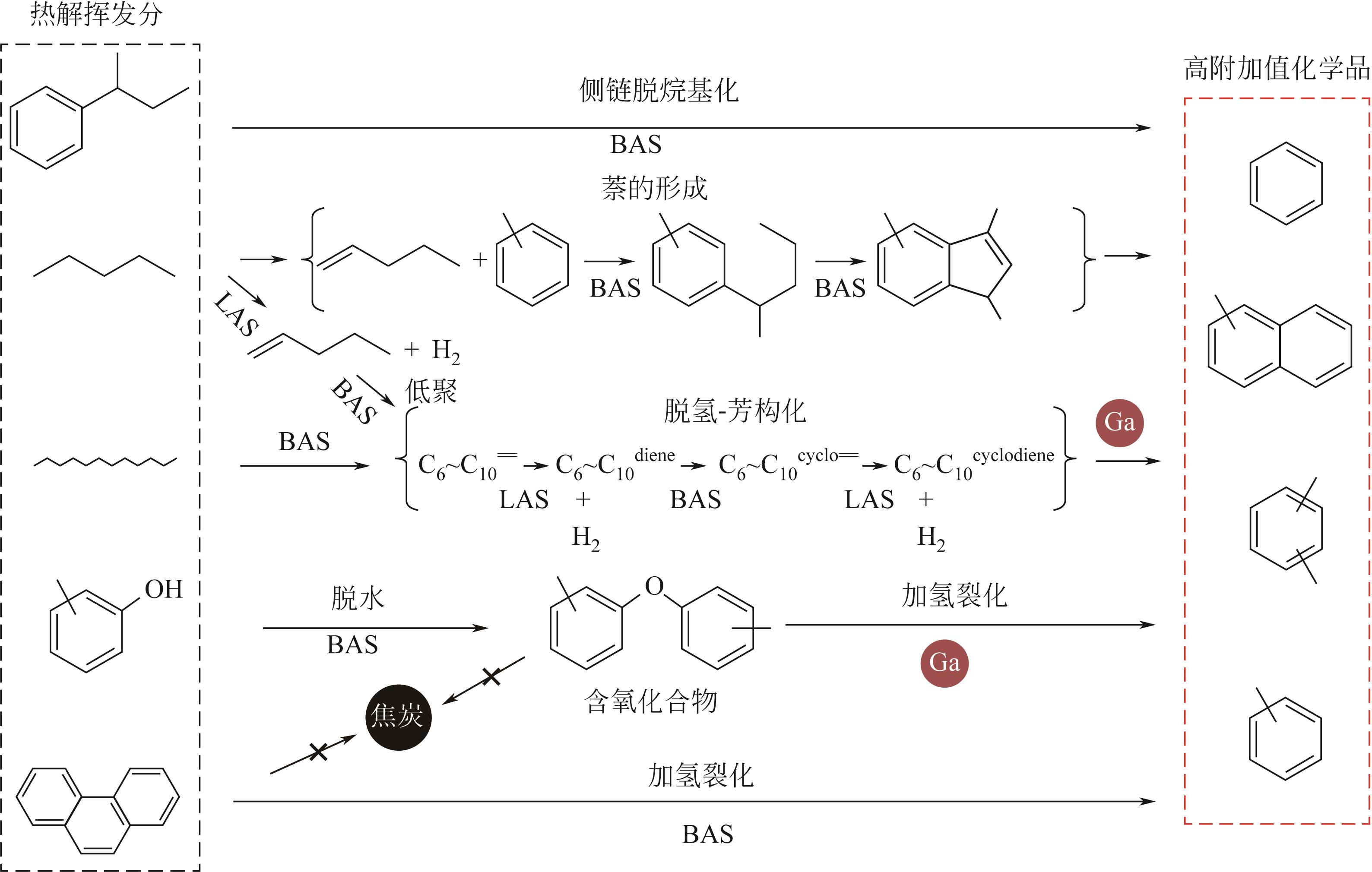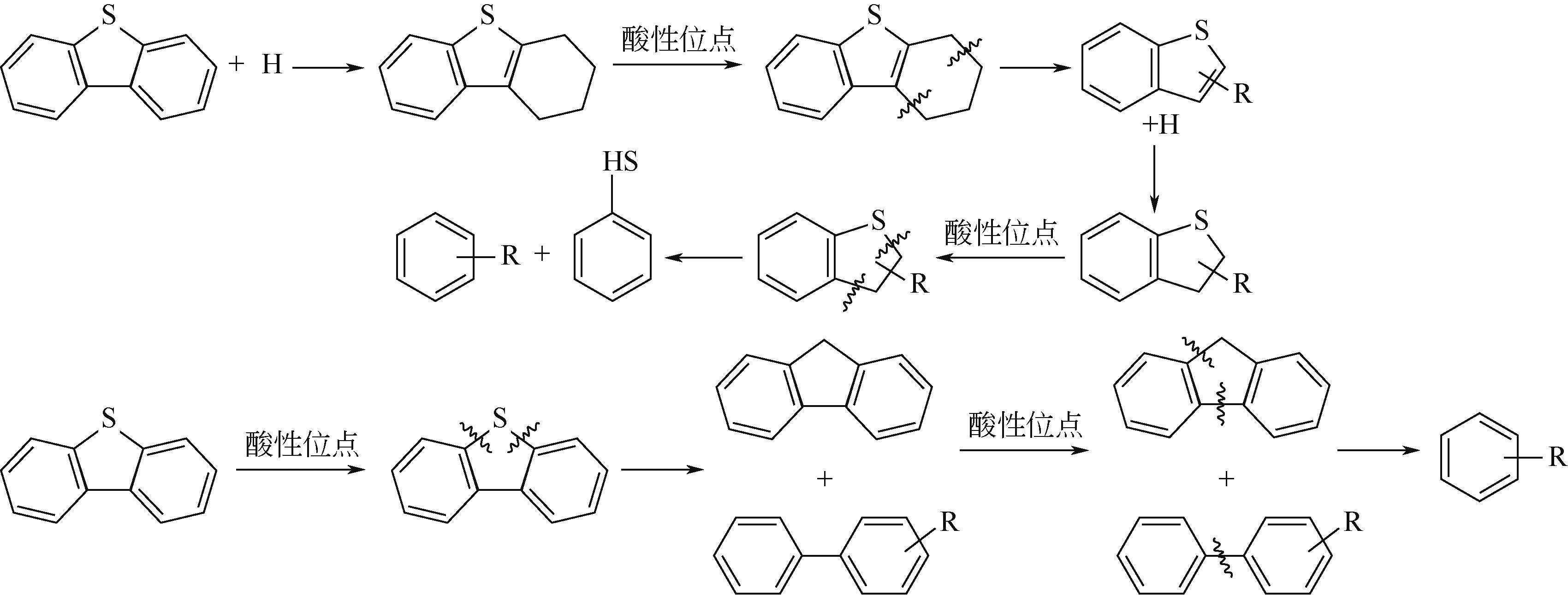Chemical Industry and Engineering Progress ›› 2024, Vol. 43 ›› Issue (5): 2279-2293.DOI: 10.16085/j.issn.1000-6613.2024-0013
• Clean and efficient utilization of fossil energy • Previous Articles
Research progress in catalytic reforming of low rank coal pyrolysis volatiles
YAO Naiyu( ), CAO Jingpei(
), CAO Jingpei( ), PANG Xinbo, ZHAO Xiaoyan, CAI Shijie, XU Min, ZHAO Jingping, FENG Xiaobo, YI Fengjiao
), PANG Xinbo, ZHAO Xiaoyan, CAI Shijie, XU Min, ZHAO Jingping, FENG Xiaobo, YI Fengjiao
- Jiangsu Province Engineering Research Center of Fine Utilization of Carbon Resources, China University of Mining & Technology, Xuzhou 221116, Jiangsu, China
-
Received:2024-01-03Revised:2024-03-25Online:2024-06-15Published:2024-05-15 -
Contact:CAO Jingpei
低阶煤热解挥发分热催化重整研究进展
姚乃瑜( ), 曹景沛(
), 曹景沛( ), 庞新博, 赵小燕, 蔡士杰, 徐敏, 赵静平, 冯晓博, 伊凤娇
), 庞新博, 赵小燕, 蔡士杰, 徐敏, 赵静平, 冯晓博, 伊凤娇
- 中国矿业大学江苏省碳资源精细化利用工程研究中心,江苏 徐州 221116
-
通讯作者:曹景沛 -
作者简介:姚乃瑜(1998—),女,博士研究生,研究方向为低阶煤和生物质的催化热解。E-mail:naiyuyao@cumt.edu.cn。 -
基金资助:国家自然科学基金(22178374)
CLC Number:
Cite this article
YAO Naiyu, CAO Jingpei, PANG Xinbo, ZHAO Xiaoyan, CAI Shijie, XU Min, ZHAO Jingping, FENG Xiaobo, YI Fengjiao. Research progress in catalytic reforming of low rank coal pyrolysis volatiles[J]. Chemical Industry and Engineering Progress, 2024, 43(5): 2279-2293.
姚乃瑜, 曹景沛, 庞新博, 赵小燕, 蔡士杰, 徐敏, 赵静平, 冯晓博, 伊凤娇. 低阶煤热解挥发分热催化重整研究进展[J]. 化工进展, 2024, 43(5): 2279-2293.
share this article
Add to citation manager EndNote|Ris|BibTeX
URL: https://hgjz.cip.com.cn/EN/10.16085/j.issn.1000-6613.2024-0013
| 反应器类型 | 反应温度/℃ | 颗粒尺寸 | 产率 | 优点 | 缺点 | 参考文献 |
|---|---|---|---|---|---|---|
| 两段式固定床 | 600 | 0.43~0.85mm | 焦:55% 液体:17.5% 气体:27.5% | 催化剂原料易于分离 | 结构复杂,能源浪费大 | [ |
| 下坠式固定床 | 600 | 0.43~1.18mm | 焦:57% 液体:18% 气体:25% | 工艺简单,升温速率高,实现了焦油的原位催化重整 | 难以长时间连续反应 | [ |
| 流化床 | 600 | 40~100μm | 焦:69% 液体:11% 气体:20% | 温控好,处理量大 | 流体力学复杂 | [ |
| 反应器类型 | 反应温度/℃ | 颗粒尺寸 | 产率 | 优点 | 缺点 | 参考文献 |
|---|---|---|---|---|---|---|
| 两段式固定床 | 600 | 0.43~0.85mm | 焦:55% 液体:17.5% 气体:27.5% | 催化剂原料易于分离 | 结构复杂,能源浪费大 | [ |
| 下坠式固定床 | 600 | 0.43~1.18mm | 焦:57% 液体:18% 气体:25% | 工艺简单,升温速率高,实现了焦油的原位催化重整 | 难以长时间连续反应 | [ |
| 流化床 | 600 | 40~100μm | 焦:69% 液体:11% 气体:20% | 温控好,处理量大 | 流体力学复杂 | [ |
| 催化剂 | 原料 | 反应条件 | 结果 | 参考文献 |
|---|---|---|---|---|
| ZnO纳米颗粒 | 土耳其低阶煤 | 催化剂/低阶煤=1,700℃,N2流量=50mL/min | 热解焦:40%,焦油:29%,气体:31% | [ |
| TiO2纳米颗粒 | 热解焦:40%,焦油:37%,气体:23% | |||
| NiO/MgO-Al2O3 | 内蒙古胜利褐煤 | 300g煤,进料速度5g/min,600℃,催化剂密度0.706g/mL | 轻质油的含量从6%增加到49% | [ |
| 赤铁矿 | 长焰煤 | 20g煤,600℃,N2流量=20mL/min | 焦油收率降低2.91%,其中沥青含量降低7.59% | [ |
| 褐铁矿、菱铁矿、赤铁矿和磁铁矿 | 内蒙古包日褐煤 | 1mg煤样,1mg催化剂,700℃,停留时间20s,Ar气氛 | 褐铁矿催化后BTEXN总面积提高52% | [ |
| Mg-Al水滑石 | 新疆次烟煤 | 催化剂/低阶煤=0.2,600℃,N2流量=200mL/min | 苯、甲苯、乙苯、二甲苯、萘和茚的含量分别提高了1.40倍、1.54倍、0.76倍、2.56倍、0.19倍和2.14倍 | [ |
| 高岭土 | 新疆哈密煤 | 催化剂/煤=0.2,500℃,N2流量=200mL/min | 焦油中芳烃含量为22.11% | [ |
| 催化剂 | 原料 | 反应条件 | 结果 | 参考文献 |
|---|---|---|---|---|
| ZnO纳米颗粒 | 土耳其低阶煤 | 催化剂/低阶煤=1,700℃,N2流量=50mL/min | 热解焦:40%,焦油:29%,气体:31% | [ |
| TiO2纳米颗粒 | 热解焦:40%,焦油:37%,气体:23% | |||
| NiO/MgO-Al2O3 | 内蒙古胜利褐煤 | 300g煤,进料速度5g/min,600℃,催化剂密度0.706g/mL | 轻质油的含量从6%增加到49% | [ |
| 赤铁矿 | 长焰煤 | 20g煤,600℃,N2流量=20mL/min | 焦油收率降低2.91%,其中沥青含量降低7.59% | [ |
| 褐铁矿、菱铁矿、赤铁矿和磁铁矿 | 内蒙古包日褐煤 | 1mg煤样,1mg催化剂,700℃,停留时间20s,Ar气氛 | 褐铁矿催化后BTEXN总面积提高52% | [ |
| Mg-Al水滑石 | 新疆次烟煤 | 催化剂/低阶煤=0.2,600℃,N2流量=200mL/min | 苯、甲苯、乙苯、二甲苯、萘和茚的含量分别提高了1.40倍、1.54倍、0.76倍、2.56倍、0.19倍和2.14倍 | [ |
| 高岭土 | 新疆哈密煤 | 催化剂/煤=0.2,500℃,N2流量=200mL/min | 焦油中芳烃含量为22.11% | [ |
| 1 | 谢克昌. “乌金” 产业绿色转型[J]. 中国煤炭工业, 2016(2): 6-7. |
| XIE Kechang. Green transformation of “Wujin” industry[J]. China Coal Industry, 2016(2): 6-7. | |
| 2 | 中华人民共和国自然资源部. 中国矿产资源报告[R]. 北京: 地质出版社, 2023. |
| Ministry of Natural Resources, People’s Republic of China. China mineral resources[R]. Beijing: Geological Publishing House, 2023. | |
| 3 | 袁亮. 我国煤炭工业高质量发展面临的挑战与对策[J]. 中国煤炭, 2020, 46(1): 6-12. |
| YUAN Liang. Challenges and countermeasures for high quality development of China’s coal industry[J]. China Coal, 2020, 46(1): 6-12. | |
| 4 | 丁肖肖, 李洪娟, 王亚涛. 褐煤低温热解分级利用现状分析及展望[J]. 洁净煤技术, 2019, 25(5): 1-7. |
| DING Xiaoxiao, LI Hongjuan, WANG Yatao. Present situation analysis and prospect of classification and utilization of lignite pyrolysis at low temperature[J]. Clean Coal Technology, 2019, 25(5): 1-7. | |
| 5 | LEI Zhang, HAO Shu, YANG Jia, et al. Study on solid waste pyrolysis coke catalyst for catalytic cracking of coal tar[J]. International Journal of Hydrogen Energy, 2020, 45(38): 19280-19290. |
| 6 | HE Mingyuan, ZHANG Kun, GUAN Yejun, et al. Green carbon science: Fundamental aspects[J]. National Science Review, 2023, 10(9): nwad046. |
| 7 | HAN Zhennan, JIA Xin, SONG Xingfei, et al. Engineering thermochemistry to cope with challenges in carbon neutrality[J]. Journal of Cleaner Production, 2023, 416: 137943. |
| 8 | 胡浩权, 狄敏娜, 王明义, 等. 煤热解焦油催化裂解和乙烷水蒸气重整耦合提高焦油品质[J]. 煤炭学报, 2020, 45(1): 386-392. |
| HU Haoquan, DI Minna, WANG Mingyi, et al. Upgrading of coal pyrolysis tar by catalytic cracking coupled with steam reforming of ethane[J]. Journal of China Coal Society, 2020, 45(1): 386-392. | |
| 9 | 胡浩权. 煤直接转化制高品质液体燃料和化学品[J]. 化工进展, 2016, 35(12): 4096-4098. |
| HU Haoquan. Coal direct conversion to high quality liquid fuels and chemicals[J]. Chemical Industry and Engineering Progress, 2016, 35(12): 4096-4098. | |
| 10 | WU Zhiqiang, YANG Wangcai, TIAN Xueyu, et al. Synergistic effects from co-pyrolysis of low-rank coal and model components of microalgae biomass[J]. Energy Conversion and Management, 2017, 135: 212-225. |
| 11 | LV Peng, YAN Lunjing, LIU Yan, et al. Catalytic upgrading of coal pyrolysis gaseous tar over hierarchical Y-type zeolites synthesized using a microwave hydrothermal method[J]. Industrial & Engineering Chemistry Research, 2019, 58(47): 21817-21826. |
| 12 | WANG Deliang, CHEN Zhaohui, ZHOU Zhimao, et al. Catalytic upgrading of volatiles from coal pyrolysis over sulfated carbon-based catalysts derived from waste red oil[J]. Fuel Processing Technology, 2019, 189: 98-109. |
| 13 | 范涛, 初茉, 畅志兵. 蒙东褐煤热解技术工业应用进展[J]. 化工进展, 2021, 40(3): 1362-1370. |
| FAN Tao, CHU Mo, CHANG Zhibing. Industrial application progress of lignite pyrolysis technology in eastern area of Inner Mongolia, China[J]. Chemical Industry and Engineering Progress, 2021, 40(3): 1362-1370. | |
| 14 | LI Chunshan, SUZUKI Kenzi. Resources, properties and utilization of tar[J]. Resources, Conservation and Recycling, 2010, 54(11): 905-915. |
| 15 | MOCHIDA I, SAKANISHI K. Catalysts for coal conversions of the next generation[J]. Fuel, 2000, 79(3/4): 221-228. |
| 16 | Tae-In OHM, CHAE Jong-Seong, Jae-Ho LIM, et al. Evaluation of a hot oil immersion drying method for the upgrading of crushed low-rank coal[J]. Journal of Mechanical Science and Technology, 2012, 26(4): 1299-1303. |
| 17 | LIU Tianlong, CAO Jingpei, ZHAO Xiaoyan, et al. In situ upgrading of Shengli lignite pyrolysis vapors over metal-loaded HZSM-5 catalyst[J]. Fuel Processing Technology, 2017, 160: 19-26. |
| 18 | JIN Lijun, BAI Xiaoyu, LI Yang, et al. In-situ catalytic upgrading of coal pyrolysis tar on carbon-based catalyst in a fixed-bed reactor[J]. Fuel Processing Technology, 2016, 147: 41-46. |
| 19 | ZHANG Huiyan, CHENG Yuting, VISPUTE Tushar P, et al. Catalytic conversion of biomass-derived feedstocks into olefins and aromatics with ZSM-5: The hydrogen to carbon effective ratio[J]. Energy & Environmental Science, 2011, 4(6): 2297-2307. |
| 20 | Suchithra THANGALAZHY-GOPAKUMAR, ADHIKARI Sushil, GUPTA Ram B. Catalytic pyrolysis of biomass over H+ZSM-5 under hydrogen pressure[J]. Energy & Fuels, 2012, 26(8): 5300-5306. |
| 21 | XU Guangwen, BAI Dingrong, XU Chunming, et al. Challenges and opportunities for engineering thermochemistry in carbon-neutralization technologies[J]. National Science Review, 2022, 10(9): nwac217. |
| 22 | GUO Z C, WANG S W, BAI D R. Engineering thermochemistry: The science critical for the paradigm shift toward carbon neutrality[J]. Resources Chemicals and Materials, 2023, 2: 331-334. |
| 23 | ZHANG Zhuangzhuang, CHANG Hui, GAO Ting, et al. Catalytic upgrading of coal pyrolysis volatiles over metal-loaded HZSM-5 catalysts in a fluidized bed reactor[J]. Journal of Analytical and Applied Pyrolysis, 2019, 139: 31-39. |
| 24 | REN Xueyu, CAO Jingpei, ZHAO Shixuan, et al. Insights into coke location of catalyst deactivation during in situ catalytic reforming of lignite pyrolysis volatiles over cobalt-modified zeolites[J]. Applied Catalysis A-general, 2021, 613: 118018. |
| 25 | 刘振宇. 煤化学的前沿与挑战: 结构与反应[J]. 中国科学: 化学, 2014, 44(9): 1431-1439. |
| LIU Zhenyu. Advancement in coal chemistry: Structure and reactivity[J]. Scientia Sinica Chimica, 2014, 44(9): 1431-1439. | |
| 26 | LIU Shengnan, CAO Jingpei, ZHAO Xiaoyan, et al. Effect of zeolite structure on light aromatics formation during upgrading of cellulose fast pyrolysis vapor[J]. Journal of the Energy Institute, 2019, 92(5): 1567-1576. |
| 27 | WAN Shaolong, WANG Yong. A review on ex situ catalytic fast pyrolysis of biomass[J]. Frontiers of Chemical Science and Engineering, 2014, 8(3): 280-294. |
| 28 | IISA Kristiina, FRENCH Richard J, ORTON Kellene A, et al. In situ and ex situ catalytic pyrolysis of pine in a bench-scale fluidized bed reactor system[J]. Energy & Fuels, 2016, 30(3): 2144-2157. |
| 29 | LIU Tao, ZHAO Jingkun, ZHANG Xiaodong. Directional conversion of volatiles from low-rank coal to BTX-rich tar by combined in situ and Ex situ catalytic pyrolyses[J]. ACS Omega, 2023, 8(4): 4419-4428. |
| 30 | WANG Xuebin, ZHANG Jiaye, BAI Shengjie, et al. Effect of pyrolysis upgrading temperature on particulate matter emissions from lignite semi-char combustion[J]. Energy Conversion and Management, 2019, 195: 384-391. |
| 31 | 吴洁, 狄佐星, 罗明生, 等. N2气氛下温度和压力对煤热解的影响[J]. 化工进展, 2019, 38(S1): 116-121. |
| WU Jie, DI Zuoxing, LUO Mingsheng, et al. Effects of temperature and pressure on coal pyrolysis in N2 atmosphere[J]. Chemical Industry and Engineering Progress, 2019, 38(S1): 116-121. | |
| 32 | XU Ying, ZHANG Yongfa, ZHANG Guojie, et al. Low temperature pyrolysates distribution and kinetics of Zhaotong lignite[J]. Energy Conversion and Management, 2016, 114: 11-19. |
| 33 | MIAO Zhenyong, WAN Yongjiang, HE Qiongqiong, et al. Pyrolysis behaviors and product distribution of Shengli Lignite at different heating rate and final temperature by TG-FTIR and Py-GC-MS[J]. Energy Sources, Part A: Recovery, Utilization, and Environmental Effects, 2021, 43(23): 3203-3215. |
| 34 | 高晋生. 煤的热解、炼焦和煤焦油加工[M]. 北京: 化学工业出版社, 2010. |
| GAO Jinsheng. Pyrolysis, coking and coal tar processing of coal[M]. Beijing: Chemical Industry Press, 2010. | |
| 35 | TIAN Bin, QIAO Yingyun, TIAN Yuanyu, et al. Investigation on the effect of particle size and heating rate on pyrolysis characteristics of a bituminous coal by TG-FTIR[J]. Journal of Analytical and Applied Pyrolysis, 2016, 121: 376-386. |
| 36 | WU Dun, LIU Guijian, CHEN Shancheng, et al. An experimental investigation on heating rate effect in the thermal behavior of perhydrous bituminous coal during pyrolysis[J]. Journal of Thermal Analysis and Calorimetry, 2015, 119(3): 2195-2203. |
| 37 | HAYASHI Jun-ichiro, TAKAHASHI Hiroshi, Satoshi DOI, et al. Reactions in brown coal pyrolysis responsible for heating rate effect on tar yield[J]. Energy & Fuels, 2000, 14(2): 400-408. |
| 38 | XU Shipei, ZENG Xi, HAN Zhennan, et al. Quick pyrolysis of a massive coal sample via rapid infrared heating[J]. Applied Energy, 2019, 242: 732-740. |
| 39 | 解强, 梁鼎成, 田萌, 等. 升温速率对神木煤热解半焦结构性能的影响[J]. 燃料化学学报, 2015, 43(7): 798-805. |
| XIE Qiang, LIANG Dingcheng, TIAN Meng, et al. Influence of heating rate on structure of chars derived from pyrolysis of Shenmu coal[J]. Journal of Fuel Chemistry and Technology, 2015, 43(7): 798-805. | |
| 40 | MIURA Kouichi. Mild conversion of coal for producing valuable chemicals[J]. Fuel Processing Technology, 2000, 62(2/3): 119-135. |
| 41 | 曲旋, 张荣, 孙东凯, 等. 固体热载体热解霍林河褐煤实验研究[J]. 燃料化学学报, 2011, 39(2): 85-89. |
| QU Xuan, ZHANG Rong, SUN Dongkai, et al. Experiment study on pyrolysis of Huolinhe lignite with solid heat carrier[J]. Journal of Fuel Chemistry and Technology, 2011, 39(2): 85-89. | |
| 42 | Steven MCCOWN M, HARRISON Douglas P. Pyrolysis and hydropyrolysis of Louisiana lignite[J]. Fuel, 1982, 61(11): 1149-1154. |
| 43 | CANEL Muammer, Zarife MıSıRLıOĞLU, CANEL Esin, et al. Distribution and comparing of volatile products during slow pyrolysis and hydropyrolysis of Turkish lignites[J]. Fuel, 2016, 186: 504-517. |
| 44 | 张晓方, 金玲, 熊燃, 等. 热分解气氛对流化床煤热解制油的影响[J]. 化工学报, 2009, 60(9): 2299-2307. |
| ZHANG Xiaofang, JIN Ling, XIONG Ran, et al. Effect of reaction atmosphere on tar production from coal pyrolysis in fluidized bed reactor[J]. Journal of the Chemical Industry and Engineering Society of China, 2009, 60(9): 2299-2307. | |
| 45 | NIU Shuaixing, ZHOU Yajie, ZHU Shenghua, et al. Investigation into the yields and characteristics of products from lignite low-temperature pyrolysis under CO2 and N2 atmospheres[J]. Journal of Analytical and Applied Pyrolysis, 2019, 138: 161-169. |
| 46 | WANG Qinhui, LI Kaikun, GUO Zhihang, et al. Effects of CO atmosphere on the pyrolysis of a typical lignite[J]. Chemical Engineering & Technology, 2021, 44(1): 85-94. |
| 47 | 高超, 马凤云, 马空军, 等. 热解气氛对煤催化热解焦油品质的影响[J]. 煤炭学报, 2015, 40(8): 1956-1962. |
| GAO Chao, MA Fengyun, MA Kongjun, et al. Effect of pyrolysis gas on the tar quality from coal catalytic pyrolysis[J]. Journal of China Coal Society, 2015, 40(8): 1956-1962. | |
| 48 | 张俊杰, 徐绍平, 王光永, 等. 停留时间对低阶煤快速热解产物分布、组成及结构的影响[J]. 化工进展, 2019, 38(3): 1346-1352. |
| ZHANG Junjie, XU Shaoping, WANG Guangyong, et al. Effect of residence time on distribution, composition and structure of products derived from fast coal pyrolysis[J]. Chemical Industry and Engineering Progress, 2019, 38(3): 1346-1352. | |
| 49 | YU W H, HAN S, LEI Z P, et al. The reaction behavior of volatiles generated from lignite pyrolysis[J]. Fuel, 2019, 244: 22-30. |
| 50 | ZHANG Lei, SHANG Jin, SHU Hao, et al. Investigation on the distribution of Yimin lignite pyrolysis products and the stability of its char[J]. ACS Omega, 2021, 6(22): 13953-13961. |
| 51 | AMIN Muhammad Nadeem, LI Yi, RAZZAQ Rauf, et al. Pyrolysis of low rank coal by nickel based zeolite catalysts in the two-staged bed reactor[J]. Journal of Analytical and Applied Pyrolysis, 2016, 118: 54-62. |
| 52 | WANG Dechao, JIN Lijun, WEI Baoyong, et al. Oxidative catalytic cracking and reforming of coal pyrolysis volatiles over NiO[J]. Energy & Fuels, 2020, 34(6): 6928-6937. |
| 53 | HU Donghai, HUANG Jiejie, ZHAO Jiantao, et al. Reaction characteristics of Shenmu coal pyrolysis volatiles with an iron-based oxygen carrier in a two-stage fixed-bed reactor[J]. Fuel Processing Technology, 2022, 235: 107371. |
| 54 | WANG Guijin, WANG Yiming, LV Jiannan, et al. Effect of red mud-based additives on the formation characteristics of tar and gas produced during coal pyrolysis[J]. Journal of the Energy Institute, 2022, 104: 1-11. |
| 55 | 赵小燕, 赵静平, 曹景沛, 等. 正丁胺改性HZSM-5对褐煤热解挥发分催化重整的影响[J]. 煤炭学报, 2022, 47(3): 1338-1346. |
| ZHAO Xiaoyan, ZHAO Jingping, CAO Jingpei, et al. Effect of n-butylamine modified HZSM-5 on catalytic reforming of lignite pyrolysis volatiles[J]. Journal of China Coal Society, 2022, 47(3): 1338-1346. | |
| 56 | CHEW Jia Wei, LAMARCHE W Casey Q, COCCO Ray A. 100 years of scaling up fluidized bed and circulating fluidized bed reactors[J]. Powder Technology, 2022, 409: 117813. |
| 57 | HU Erfeng, ZHU Chuanqiang, ROGERS Kyle, et al. Coal pyrolysis and its mechanism in indirectly heated fixed-bed with metallic heating plate enhancement[J]. Fuel, 2016, 185: 656-662. |
| 58 | LAI Dengguo, CHEN Zhaohui, SHI Yong, et al. Pyrolysis of oil shale by solid heat carrier in an innovative moving bed with internals[J]. Fuel, 2015, 159: 943-951. |
| 59 | CHEN Zhaohui, WANG Demin, LI Changming, et al. A tandem pyrolysis-upgrading strategy in an integrated reactor to improve the quality of coal tar[J]. Energy Conversion and Management, 2020, 220: 113065. |
| 60 | BILGE Selva, DONAR Yusuf Osman, Ali SıNAĞ. Effect of metal oxide nanoparticles on the evolution of valuable gaseous products during pyrolysis of Turkish low-rank coal[J]. Journal of Analytical and Applied Pyrolysis, 2018, 136: 242-247. |
| 61 | LI Yi, AMIN Muhammad Nadeem, LU Xingmei, et al. Pyrolysis and catalytic upgrading of low-rank coal using a NiO/MgO-Al2O3 catalyst[J]. Chemical Engineering Science, 2016, 155: 194-200. |
| 62 | SONG Qiang, ZHAO Hongyu, CHANG Shengqiang, et al. Study on the catalytic pyrolysis of coal volatiles over hematite for the production of light tar[J]. Journal of Analytical and Applied Pyrolysis, 2020, 151: 104927. |
| 63 | HE Lu, HUI Helong, LI Songgeng, et al. Production of light aromatic hydrocarbons by catalytic cracking of coal pyrolysis vapors over natural iron ores[J]. Fuel, 2018, 216: 227-232. |
| 64 | YANG Hang, ZHANG Jiehan, LI Changming, et al. The effect of acid-base synergistic catalysis on upgrading of volatiles from coal pyrolysis over Mg-Al composite oxides[J]. Fuel, 2022, 321: 124030. |
| 65 | HOU Yujie, BAI Zongqing, LU Hao, et al. In-situ catalytic upgrading of Hami coal pyrolysis volatiles over acid-modified Kaolin[J]. Fuel, 2023, 331: 125660. |
| 66 | WANG D C, JIN L J, LI Y, et al. Effect of reducibility of transition metal oxides on in-situ oxidative catalytic cracking of tar[J]. Energy Conversion and Management, 2019, 197: 111871. |
| 67 | YAN Lunjing, BAI Yonghui, KONG Xiaojun, et al. Effects of alkali and alkaline earth metals on the formation of light aromatic hydrocarbons during coal pyrolysis[J]. Journal of Analytical and Applied Pyrolysis, 2016, 122: 169-174. |
| 68 | LIANG Peng, ZHANG Yaqing, WEI Aifang, et al. Cracking characteristics of simulated dust-containing coal pyrolysis volatiles over regenerated nickel-based catalysts[J]. Energy & Fuels, 2015, 29(1): 70-77. |
| 69 | LI Yuhuan, ZHAO Hongyu, SUI Xin, et al. Studies on individual pyrolysis and co-pyrolysis of peat-biomass blends: Thermal decomposition behavior, possible synergism, product characteristic evaluations and kinetics[J]. Fuel, 2022, 310: 122280. |
| 70 | SONG Qiang, ZHAO Hongyu, MA Qingxiang, et al. Catalytic upgrading of coal volatiles with Fe2O3 and hematite by TG-FTIR and Py-GC/MS[J]. Fuel, 2022, 313: 122667. |
| 71 | ZOU Xianwu, YAO Jianzhong, YANG Xuemin, et al. Catalytic effects of metal chlorides on the pyrolysis of lignite[J]. Energy & Fuels, 2007, 21(2): 619-624. |
| 72 | 杨晓霞, 汪自典, 付峰, 等. 炭基催化剂对煤热解油气品质的影响及机理[J]. 煤炭转化, 2019, 42(3): 10-17. |
| YANG Xiaoxia, WANG Zidian, FU Feng, et al. Effects of carbon-based catalysts on quality of coal tar and gas and its mechanism[J]. Coal Conversion, 2019, 42(3): 10-17. | |
| 73 | LI Xiaohong, MA Jiangshan, LI Lili, et al. Semi-coke as solid heat carrier for low-temperature coal tar upgrading[J]. Fuel Processing Technology, 2016, 143: 79-85. |
| 74 | LI Xiaohong, LI Baofu, FU Daqing, et al. The interaction between the char solid heat carrier and the volatiles during low-rank coal pyrolysis[J]. Journal of Analytical and Applied Pyrolysis, 2018, 136: 160-168. |
| 75 | HAN Jiangze, WANG Xingdong, YUE Junrong, et al. Catalytic upgrading of coal pyrolysis tar over char-based catalysts[J]. Fuel Processing Technology, 2014, 122: 98-106. |
| 76 | 靳鑫, 王倩, 李晓荣, 等. 煤热解挥发分在活性炭上的积炭行为及其过程分析[J]. 燃料化学学报, 2021, 49(5): 609-616, 564. |
| JIN Xin, WANG Qian, LI Xiaorong, et al. Coke formation on activated carbon during catalytic upgrading of coal pyrolysis volatiles[J]. Journal of Fuel Chemistry and Technology, 2021, 49(5): 609-616, 564. | |
| 77 | WU Qinming, LUAN Huimin, XIAO Fengshou. Targeted synthesis of zeolites from calculated interaction between zeolite structure and organic template[J]. National Science Review, 2022, 9(9): nwac023. |
| 78 | 梁燕燕, 张军亮, 郭云鸦, 等. 晶种在分子筛合成中的作用研究进展[J]. 化工进展, 2024, 43(3): 1275-1292. |
| LIANG Yanyan, ZHANG Junliang, GUO Yunya, et al. The role of seed in the synthesis of molecular sieves[J]. Chemical Industry and Engineering Progress, 2024, 43(3): 1275-1292. | |
| 79 | YAO Qiuxiang, LIU Yongqi, ZHANG Dan, et al. Catalytic conversion of a≥200℃ fraction separated from low-temperature coal tar into light aromatic hydrocarbons[J]. ACS Omega, 2021, 6(5): 4062-4073. |
| 80 | CHE Yuanjun, SHI Kunmou, CUI Zihang, et al. Conversion of low temperature coal tar into high value-added chemicals based on the coupling process of fast pyrolysis and catalytic cracking[J]. Energy, 2023, 264: 126169. |
| 81 | LIU Yongqi, YAO Qiuxiang, SUN Ming, et al. Catalytic fast pyrolysis of coal tar asphaltene over zeolite catalysts to produce high-grade coal tar: An analytical Py-GC/MS study[J]. Journal of Analytical and Applied Pyrolysis, 2021, 156: 105127. |
| 82 | 李勇, 闫伦靖, 李晓荣, 等. 酸/碱催化剂对低阶煤热解挥发分转化行为的作用机制研究[J]. 化工学报, 2022, 73(3): 1173-1183. |
| LI Yong, YAN Lunjing, LI Xiaorong, et al. Study on the mechanism of acid/base catalyst on the release behavior of volatiles during low rank coal pyrolysis[J]. CIESC Journal, 2022, 73(3): 1173-1183. | |
| 83 | YAN Lunjing, KONG Xiaojun, ZHAO Ruifang, et al. Catalytic upgrading of gaseous tars over zeolite catalysts during coal pyrolysis[J]. Fuel Processing Technology, 2015, 138: 424-429. |
| 84 | LE Jiawei, LIU Peng, LIU Dingchao, et al. Effect of catalysts on the yields of light components and phenols derived from Shenmu coal low temperature pyrolysis[J]. Energy & Fuels, 2017, 31(7): 7033-7041. |
| 85 | YANG Zhen, CAO Jingpei, ZHAO Xiaoyan, et al. Enhanced light aromatic yield from lignite pyrolysis by remedying the acid sites of different hierarchical HZSM-5[J]. Energy & Fuels, 2019, 33(12): 12346-12352. |
| 86 | YANG Zhen, CAO Jingpei, REN Xueyu, et al. Preparation of hierarchical HZSM-5 based sulfated zirconium solid acid catalyst for catalytic upgrading of pyrolysis vapors from lignite pyrolysis[J]. Fuel, 2019, 237: 1079-1085. |
| 87 | REN Xueyu, CAO Jingpei, ZHAO Xiaoyan, et al. Enhancement of aromatic products from catalytic fast pyrolysis of lignite over hierarchical HZSM-5 by piperidine-assisted desilication[J]. ACS Sustainable Chemistry & Engineering, 2018, 6(2): 1792-1802. |
| 88 | ZHAO J P, CAO J P, WEI F, et al. Catalytic reforming of lignite pyrolysis volatiles over sulfated HZSM-5: Significance of the introduced extra-framework Al species[J]. Fuel, 2020, 273: 117789. |
| 89 | ZHAO Jingping, CAO Jingpei, WEI Fu, et al. Catalytic upgrading of lignite pyrolysis volatiles over AlF3-modified HZSM-5 to light aromatics: Synergistic effects of one-step dealumination and realumination[J]. Energy & Fuels, 2021, 35(15): 12056-12064. |
| 90 | ZHAO J P, CAO J P, WEI F, et al. Sulfation-acidified HZSM-5 catalyst for in-situ catalytic conversion of lignite pyrolysis volatiles to light aromatics[J]. Fuel, 2019, 255: 115784. |
| 91 | LIU Yujie, YAN Lunjing, BAI Yonghui, et al. Catalytic upgrading of volatile from coal pyrolysis over faujasite zeolites[J]. Journal of Analytical and Applied Pyrolysis, 2018, 132: 184-189. |
| 92 | WEI Baoyong, JIN Lijun, WANG Dechao, et al. Catalytic upgrading of lignite pyrolysis volatiles over modified HY zeolites[J]. Fuel, 2020, 259: 116234. |
| 93 | Peng LYU, YAN Lunjing, LIU Yan, et al. Catalytic conversion of coal pyrolysis vapors to light aromatics over hierarchical Y-type zeolites[J]. Journal of the Energy Institute, 2020, 93(4): 1354-1363. |
| 94 | WEI Baoyong, JIN Lijun, WANG Dechao, et al. Effect of different acid-leached USY zeolites on in situ catalytic upgrading of lignite tar[J]. Fuel, 2020, 266: 117089. |
| 95 | 吴卓卓, 杨志远, 鞠晓茜, 等. 酸洗改性对USY分子筛结构及煤催化热解性能的影响[J]. 洁净煤技术, 2023, 29(5): 21-27. |
| WU Zhuozhuo, YANG Zhiyuan, JU Xiaoqian, et al. Effect of acid-leached modification on the structure of USY zeolite and catalytic pyrolysis performance of coal[J]. Clean Coal Technology, 2023, 29(5): 21-27. | |
| 96 | REN Xueyu, CAO Jingpei, ZHAO Xiaoyan, et al. Increasing light aromatic products during upgrading of lignite pyrolysis vapor over Co-modified HZSM-5[J]. Journal of Analytical and Applied Pyrolysis, 2018, 130: 190-197. |
| 97 | LI Guanlong, YAN Lunjing, ZHAO Ruifang, et al. Improving aromatic hydrocarbons yield from coal pyrolysis volatile products over HZSM-5 and Mo-modified HZSM-5[J]. Fuel, 2014, 130: 154-159. |
| 98 | REN X Y, CAO J P, ZHAO X Y, et al. Catalytic upgrading of pyrolysis vapors from lignite over mono/bimetal-loaded mesoporous HZSM-5[J]. Fuel, 2018, 218: 33-40. |
| 99 | AMIN Muhammad Nadeem, AHMED Ashfaq, LI Yi, et al. Ex-situ catalytic fast pyrolysis of low-rank coal over HZSM-5 and modified Mg/HZSM-5 catalysts[J]. International Journal of Energy Research, 2022, 46(2): 891-899. |
| 100 | WEI Baoyong, YANG He, HU Haoquan, et al. Enhanced production of light tar from integrated process of in situ catalytic upgrading lignite tar and methane dry reforming over Ni/mesoporous Y[J]. Fuel, 2020, 279: 118533. |
| 101 | HE Yuanyuan, YAN Lunjing, LIU Yujie, et al. Effect of SiO2/Al2O3 ratios of HZSM-5 zeolites on the formation of light aromatics during lignite pyrolysis[J]. Fuel Processing Technology, 2019, 188: 70-78. |
| 102 | REN X Y, CAO J P, ZHAO X Y, et al. Catalytic conversion of lignite pyrolysis volatiles to light aromatics over ZSM-5: SiO2/Al2O3 ratio effects and mechanism insights[J]. Journal of Analytical & Applied Pyrolysis, 2019, 139: 22-30. |
| 103 | 王德亮, 陈兆辉, 余剑, 等. 不同硅铝比HZSM-5分子筛对煤热解挥发物催化提质的影响[J]. 燃料化学学报, 2021, 49(5): 634-640. |
| WANG Deliang, CHEN Zhaohui, YU Jian, et al. Effect of Si/Al ratio of HZSM-5 zeolites on catalytic upgrading of coal pyrolysis volatiles[J]. Journal of Fuel Chemistry and Technology, 2021, 49(5): 634-640. | |
| 104 | 杨珍, 曹景沛, 朱陈, 等. B-ZSM-5酸调控及催化褐煤热解挥发分制轻质芳烃研究[J]. 化工学报, 2021, 72(11): 5633-5642. |
| YANG Zhen, CAO Jingpei, ZHU Chen, et al. Catalytic conversion of lignite pyrolysis volatiles for enriching light aromatics over B-ZSM-5[J]. CIESC Journal, 2021, 72(11): 5633-5642. | |
| 105 | 任雪宇, 曹景沛, 姚乃瑜, 等. 模板法调控多级孔ZSM-5催化褐煤挥发分制备轻质芳烃的研究[J]. 化工学报, 2021, 72(11): 5620-5632. |
| REN Xueyu, CAO Jingpei, YAO Naiyu, et al. Turning hierarchical ZSM-5 by template methods and its application in catalyzing lignite-derived volatiles to light aromatics[J]. CIESC Journal, 2021, 72(11): 5620-5632. | |
| 106 | FENG Xiaobo, CAO Jingpei, YAO Naiyu, et al. Simultaneous enhancement of aromatic products and catalytic lifetime for catalytic re-forming of lignite pyrolysis volatiles over a self-assembled hierarchical core-shell ZSM-5@Silicalite-1 zeolite[J]. ACS Sustainable Chemistry & Engineering, 2021, 9(38): 12960-12969. |
| 107 | YANG Zhen, CAO Jingpei, LIU Tianlong, et al. Controllable hollow HZSM-5 for high shape-selectivity to light aromatics from catalytic reforming of lignite pyrolysis volatiles[J]. Fuel, 2021, 294: 120427. |
| 108 | BI Chenyao, WANG Xu, YOU Qing, et al. Catalytic upgrading of coal pyrolysis volatiles by Ga-substituted mesoporous ZSM-5[J]. Fuel, 2020, 267: 117217. |
| 109 | BI Chenyao, ZHANG Zhuangzhuang, HAN Daizong, et al. Effective regulation of Ga active species in mesoporous ZSM-5 for catalytic upgrading of coal pyrolysis volatiles[J]. Fuel, 2022, 321: 124105. |
| 110 | YANG Zhen, CAO Jingpei, ZHU Chen, et al. In situ reforming of lignite pyrolysis volatiles for enriching light aromatics over Ga substituted HZSM-5[J]. Chemical Engineering Science, 2022, 248: 117235. |
| 111 | YANG Z, CAO J P, LIU T L, et al. Boosted production of aromatics by catalyzing upgrade pyrolysis vapors from lignite over Sn-Ga/HZSM‑5 catalysts[J]. Journal of Analytical and Applied Pyrolysis, 2021, 155: 105064. |
| 112 | 陈永安, 周安宁, 李云龙, 等. 磁性MgFe2O4及其核壳催化剂制备与煤热解性能研究[J]. 化工学报, 2022, 73(7): 3026-3037. |
| CHEN Yongan, ZHOU Anning, LI Yunlong, et al. Preparation and coal pyrolysis performance of magnetic MgFe2O4 and its core-shell catalysts[J]. CIESC Journal, 2022, 73(7): 3026-3037. | |
| 113 | YANG Hang, ZHANG Jiehan, CHEN Zhaohui, et al. Base-acid relay catalytic upgrading of coal pyrolysis volatiles over CaO and HZSM-5 catalysts[J]. Journal of Analytical and Applied Pyrolysis, 2023, 170: 105926. |
| 114 | ZHAO X Y, REN X Y, WANG Y J, et al. Conversion of lignite-derived volatiles into aromatics over Zn@MCM-41 and ZSM-5 tandem catalysts with a high stability[J]. Fuel, 2023, 339: 127430. |
| 115 | ZHOU Guofeng, JENSEN Peter A, LE Duy M, et al. Direct upgrading of fast pyrolysis lignin vapor over the HZSM-5 catalyst[J]. Green Chemistry, 2016, 18(7): 1965-1975. |
| 116 | SHI Yanchun, XING Enhui, WU Kejing, et al. Recent progress on upgrading of bio-oil to hydrocarbons over metal/zeolite bifunctional catalysts[J]. Catalysis Science & Technology, 2017, 7(12): 2385-2415. |
| [1] | LIU Shida, WANG Haiyan, HOU Shuandi, LIU Zhongsheng, LIAO Changjian, WANG Kuanling. Recent advances in safely efficient deep emission reduction, recovery and thermal oxidation of VOCs from petrochemical storage tanks in China [J]. Chemical Industry and Engineering Progress, 2024, 43(4): 2063-2076. |
| [2] | HAI Yan, ZHOU Xin, LI Yan. Rapid start-up performance of mainstream Anammox in a single-stage fixed-bed biofilm reactor [J]. Chemical Industry and Engineering Progress, 2024, 43(4): 2201-2209. |
| [3] | ZHAO Ruiqiang, ZHOU Xin, NIU Bingxin. Construction of a coupled process integrating dissimilatory nitrate reduction and anaerobic ammonia oxidation/denitrification for wastewater treatment [J]. Chemical Industry and Engineering Progress, 2024, 43(3): 1593-1605. |
| [4] | YAO Fuchun, BI Yingying, TANG Chen, DU Minghui, LI Zeying, ZHANG Yaozong, SUN Xiaoming. Analysis of the mass transfer mechanism in a hollow fiber membrane ozone contact reactor [J]. Chemical Industry and Engineering Progress, 2024, 43(2): 1089-1097. |
| [5] | HOU Likai, FAN Xu, BAO Fubing. Calibration technique of micro-liquid flow [J]. Chemical Industry and Engineering Progress, 2024, 43(2): 579-585. |
| [6] | ZHANG Jiahao, LI Yingying, XU Yanlin, YIN Jiabin, ZHANG Jisong. Research advancement of continuous reductive amination in microreactors [J]. Chemical Industry and Engineering Progress, 2024, 43(1): 186-197. |
| [7] | SHENG Weiwu, CHENG Yongpan, CHEN Qiang, LI Xiaoting, WEI Jia, LI Linge, CHEN Xianfeng. Operating condition analysis of the microbubble and microdroplet dual-enhanced desulfurization reactor [J]. Chemical Industry and Engineering Progress, 2023, 42(S1): 142-147. |
| [8] | HUANG Yiping, LI Ting, ZHENG Longyun, QI Ao, CHEN Zhenglin, SHI Tianhao, ZHANG Xinyu, GUO Kai, HU Meng, NI Zeyu, LIU Hui, XIA Miao, ZHU Kai, LIU Chunjiang. Hydrodynamics and mass transfer characteristics of a three-stage internal loop airlift reactor [J]. Chemical Industry and Engineering Progress, 2023, 42(S1): 175-188. |
| [9] | DENG Liping, SHI Haoyu, LIU Xiaolong, CHEN Yaoji, YAN Jingying. Non-noble metal modified vanadium titanium-based catalyst for NH3-SCR denitrification simultaneous control VOCs [J]. Chemical Industry and Engineering Progress, 2023, 42(S1): 542-548. |
| [10] | XU Jiaheng, LI Yongsheng, LUO Chunhuan, SU Qingquan. Optimization of methanol steam reforming process [J]. Chemical Industry and Engineering Progress, 2023, 42(S1): 41-46. |
| [11] | LIU Xuanlin, WANG Yikai, DAI Suzhou, YIN Yonggao. Analysis and optimization of decomposition reactor based on ammonium carbamate in heat pump [J]. Chemical Industry and Engineering Progress, 2023, 42(9): 4522-4530. |
| [12] | LUO Cheng, FAN Xiaoyong, ZHU Yonghong, TIAN Feng, CUI Louwei, DU Chongpeng, WANG Feili, LI Dong, ZHENG Hua’an. CFD simulation of liquid distribution in different distributors in medium-low temperature coal tar hydrogenation reactor [J]. Chemical Industry and Engineering Progress, 2023, 42(9): 4538-4549. |
| [13] | CHENG Tao, CUI Ruili, SONG Junnan, ZHANG Tianqi, ZHANG Yunhe, LIANG Shijie, PU Shi. Analysis of impurity deposition and pressure drop increase mechanisms in residue hydrotreating unit [J]. Chemical Industry and Engineering Progress, 2023, 42(9): 4616-4627. |
| [14] | GE Yafen, SUN Yu, XIAO Peng, LIU Qi, LIU Bo, SUN Chengying, GONG Yanjun. Research progress of zeolite for VOCs removal [J]. Chemical Industry and Engineering Progress, 2023, 42(9): 4716-4730. |
| [15] | SHI Tianxi, SHI Yonghui, WU Xinying, ZHANG Yihao, QIN Zhe, ZHAO Chunxia, LU Da. Effects of Fe2+ on the performance of Anammox EGSB reactor [J]. Chemical Industry and Engineering Progress, 2023, 42(9): 5003-5010. |
| Viewed | ||||||
|
Full text |
|
|||||
|
Abstract |
|
|||||
